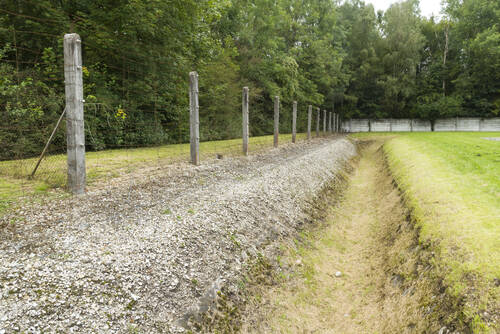Today we celebrate the seventieth anniversary of the liberation of the concentration camp at Dachau, Germany. It is a great day to be sure, but sometimes I think we are commemorating the wrong event. Wouldn’t it make more sense to focus on the time, almost seven years earlier, when the camp became known for intimidating Jews? The liberation, by all accounts, came far too late for most inmates. But in 1938, when Jews—particularly Jewish men—were being carted off to Dachau in great numbers in the wake of the so-called “Kristallnacht,” or “Night of Broken Glass,” something might still have been done.
I visited Dachau for the first time with my students almost thirty years ago. At that time I was teaching German at a boys prep school in Jersey City, NJ. It may be an unfair generalization, but in my experience boys are simply much more likely to exhibit a sometimes baffling degree of “war buff “enthusiasm. At least mine did. I constantly got questions from them about the (to me) arcane differences between the Nazi elite police squads—such as the SD, SA, SS, Gestapo, etc. To be honest, I could never keep it all straight, which disappointed my students, who could tell me, with impressive levels of accuracy, exactly how many tank divisions Rommel led in North Africa, and how many sorties the Germans flew over Britain in a given war year.
Undeniably, they were interested in “history”; and I suppose we should be grateful for that. But they seemed much more excited about military strategy and personalities than about those larger moral questions of the war and the Holocaust. They found it all too exciting. My work seemed cut out for me.
So on our tour of Germany later that year, I decided to take them to Dachau. Let them see first-hand what happened, I thought. Well, the concentration camps don’t really tell their own story. The high point, if you can call it that, were the crematoria and gas chamber, which my students inevitably confused with Auschwitz. It was all they could talk about. It seems we were determined to see in Dachau the quintessential extermination camp, instead of the horrible concentration camp it mainly was—a large and dangerous political prison and forced labor camp that had opened already in 1933 when the Nazis came to power, but really only hit its stride in the wake of the Kristallnacht incarcerations.
It didn’t really surprise me that my boys went right for the high drama. It seemed that it was my job, though, to get them to see that there was plenty of “drama” in Dachau as it was. To see that a camp that had been used to enslave workers, conduct “medical experiments,” and to abuse and intimidate Jews into fleeing Germany (after leaving their wealth in country) was bad enough, and worthy of our attention. Yes, thousands died there, and some were indeed killed with cruel calculation: there was a special courtyard designated for summary executions. But the camp’s principal purpose was not to abet the genocide that would really only begin in earnest in 1941. Before the war had even begun, Dachau’s most notorious mission was to bully German Jews into “voluntary” emigration.
That evening, we ate a dinner of greasy roasted chicken at the “Wienerwald” located in the little town of Dachau itself. Oddly, that is what I remember most clearly: just the fact that there is a quaint little German town bearing the same name as the notorious camp. And that people live apparently ordinary lives here, much as they must have when those approximately 10,000 Jews rounded up in the November pogrom of 1938 were brought through this peaceful little village. What did those residents see? What did they think?
It is all fine and good to celebrate the liberation of Dachau. But why don’t we recall with at least as much interest the time when Dachau became Dachau? When it first swelled its prisoner ranks with German Jews who had suddenly been “disappeared” from neighborhoods all across Germany? You can debate endlessly about who know what (and how much) about the Holocaust per se—the genocide perpetrated largely in Poland and Eastern Europe. But virtually every German would have noticed the disappearance of his or her neighbors. Remembering that point in history—a juncture when resistance, protest and plain old civic courage were still conceivable—may be the far more important history lesson.
William Collins Donahue is the Bishop MacDermott Professor of German Studies, and Professor of Jewish Studies at Duke University.








